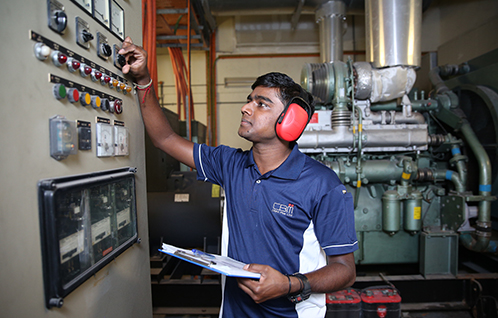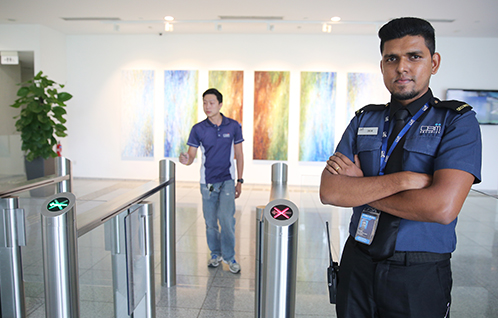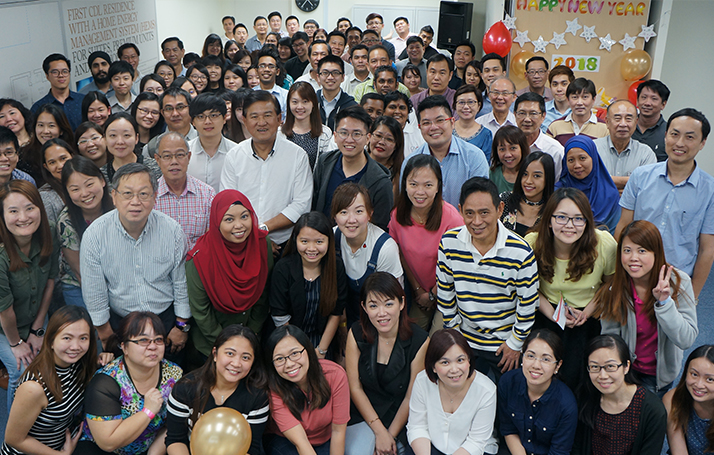 CBM has a total staff strength of about 2,100 people across their companies.
CBM has a total staff strength of about 2,100 people across their companies.
CBM Takes
A Fresh Look
At Facilities
Management
And Tackles
Labour Challenges
CBM, a subsidiary of City Developments Limited (CDL), was established in 1971 to provide in-house Engineering, Cleaning and Security services for CDL’s properties. The company has since grown into an integrated Facilities Management (FM) company delivering other essential services such as Managing Agent, Project Management, Car Park Management & Operations, System Integration, Sustainability Consultancy, and Commercial and Retail Laundry Services.
Then the transformational journey began in 2007. CBM expanded its clientele, range of services, and went overseas and has an active presence in Qatar, Thailand and Taiwan today. Since then, going digital has become an integral part of its work processes as the company continues to tackle the labour crunch and expands its offerings. Here is how CBM does it. This article is adapted from the 17 July 2018 issue of The Business Times, Singapore’s business daily.
New broom sweeps clean
"We had a fresh look at the company,” said Mr Roy Chiang, who became CBM’s Chief Executive Officer in 2007. The transformation was aided by former heads of department who decided "to let younger guys take the reins", he adds.
As a subsidiary of major property developer CDL, the team then thought it prudent to capitalise on the potential and opportunities that are available to them. CBM thus sought new clients. Turnover rose from S$30-35 million in 2007 to S$150 million today.
Previously, some 80% of CBM's revenue came from CDL's projects, and the remaining 20%. Today it is the reverse, thanks to the firm's enlarged client base.
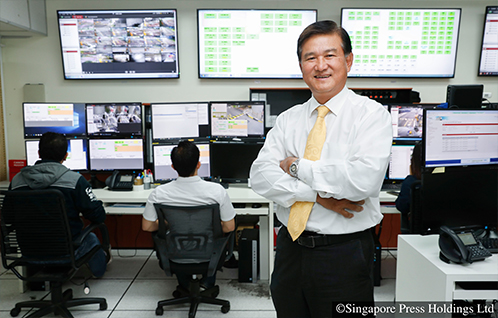 Mr Roy Chiang, CEO and President of CBM Pte Ltd, pictured here in CBM's Control Centre.
Mr Roy Chiang, CEO and President of CBM Pte Ltd, pictured here in CBM's Control Centre.
Overseas and portfolio expansion
CBM’s second major push was to venture overseas. The firm first entered Abu Dhabi but later pulled out "because things were moving slowly". Its stint in India was also short-lived. Then it entered Qatar in 2009 and Thailand in 2013, and it is still present in both markets today.
In 2011, CBM started developing and testing equipment in commercial carparks. Two years later, it expanded into Housing Board carparks. Then in 2014, it went to Taiwan to develop a carpark management business, as its existing carpark equipment partner was a Taiwanese company.
CBM also capitalised on existing capabilities such as expertise gained from working on green building projects, and formed green consultancy, CBM Solutions in 2009.
Besides M&E services and cleaning, CBM also offers housekeeping, security, carpark management, carpark equipment supply, and laundry services. Says Mr Chiang: "By doing it in-house, you can control quality on the ground."
CBM’s Engineering and Security Divisions at work, pictured left and right respectively.
There's an app for that
But perhaps the broadest skill that CBM has acquired is the ability to think digital. Software and mobile applications have become an important part of CBM's work, both internally and in helping to meet clients' needs.
CBM helped develop an automated life cycle information tool for a client which helped them track the lifespan of physical assets such as lifts and air-conditioning. These assets usually accumulate hard-copy records of breakdowns or servicing, which can be challenging to keep track, especially if the service provider changes. The life cycle information tool makes it easier to keep all relevant data in.
In its own operations, CBM uses a range of software to manage work processes. This includes a messaging service which can track both submitted photographs of issues, and subsequent follow-up actions taken. Each chat group includes the relevant client, so the client can see what is being done.
To boost housekeeping efficiency, CBM has an app through which room attendants can send photographs of the rooms they have cleaned to their supervisors. Previously, supervisors would have had to check each room.
Another app, introduced early last year, makes existing web-based software - in use for the past eight years via desktop - available on smartphones, making it easier to deal with customer complaints on the go. Previously, if a customer called in, the relevant department would then have to call the manager on the ground to get details of the issue. With the app, such details can be easily and instantly shared instead.
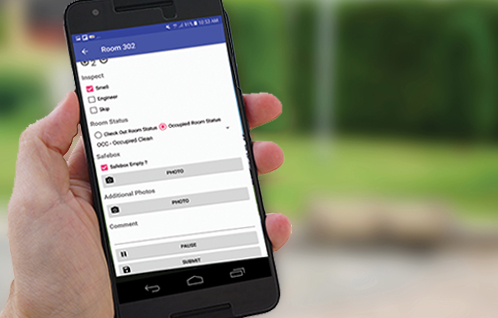 Supervisors can use backend system to assign rooms to each Room Attendant, who will then proceed to clean rooms and record it in the app accordingly.
Supervisors can use backend system to assign rooms to each Room Attendant, who will then proceed to clean rooms and record it in the app accordingly.
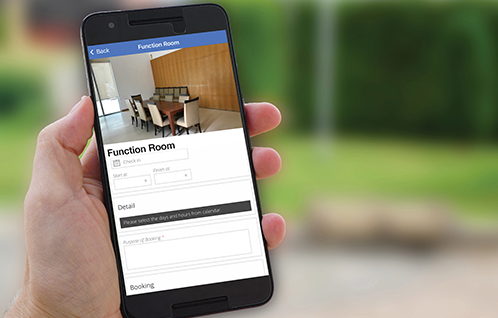 Exclusively available to residents of select condominiums managed by Empire City Consultant Pte Ltd (CBM's Managing Agent subsidiary), the MyCondo App provides customisable features that includes facilities booking, e-invoicing, announcements, visitor management, and online payments.
Exclusively available to residents of select condominiums managed by Empire City Consultant Pte Ltd (CBM's Managing Agent subsidiary), the MyCondo App provides customisable features that includes facilities booking, e-invoicing, announcements, visitor management, and online payments.
Some of these apps and software were developed with the help of third-party developers, while others were simply purchased off-the-shelf.
Though both approaches require some outlay, CBM is willing to make the investment. Such decisions are not contingent on external funding, says Mr Chiang: "Typically we don't wait for the funding, we do it ourselves first. The main driving force is not so much the funding part but the need on the ground.”
For example, one tablet app was developed in 2011 to address a specific project's demands. CBM was tasked with inspecting neighbourhood coffeeshops twice a month, with one of the inspections having to take place after 11pm.
After taking photographs during the site visit, the inspectors had to work even later into the night, making notes on each photograph. The project required more than 20 staff.
To make the process easier, CBM commissioned an app where photos can be taken and forms can be filled out and sent directly to the client. Granting greater efficiency, the app helped reduce the team to 14 people, a manpower savings of about a third.
Going manpower-lean
Singapore's manpower crunch is a major driving force behind CBM's efficiency push. "We have always been conscious that we cannot just rely on labour,” said Mr Chiang.
He gives the example of carpark management. By next year, CBM will have 300 carparks under its care. "You cannot have people stationed at every one." So instead, all carpark hotline calls go to a single central monitoring room that is active 24/7.
One of CBM's biggest productivity investments to date is for its laundry subsidiary, Systematic Holdings, in which it bought a 70% stake. Systematic's current set-up features some automation but requires manual loading and unloading: from the washer to the dryer, then on to ironing, folding and packaging.
In contrast, the new set-up will have a tunnel washer that sends freshly-washed laundry straight for drying, and a conveyor system that reduces the need for loading and unloading. New folding and packaging machines will also be added. The new laundry system, which is due for completion in Q2 2019. It is supported by WorkPro grant, administered by the Employment and Employability Institute.
 Systematic’s new laundry system at the upcoming Central Laundry Plant, will be able to handle 70 to 75 tonnes of laundry a day over an eight-hour shift, making the new system about three times as productive as the existing one which handles 35 to 39 tonnes of laundry with 80 people over a 12-hour shift. The new system is expected to be completed in Q2 2019.
Systematic’s new laundry system at the upcoming Central Laundry Plant, will be able to handle 70 to 75 tonnes of laundry a day over an eight-hour shift, making the new system about three times as productive as the existing one which handles 35 to 39 tonnes of laundry with 80 people over a 12-hour shift. The new system is expected to be completed in Q2 2019.
CBM is also reducing Systematic's retail fronts and introducing a "vending machine concept" instead. With the new "Systematic ATM" concept, now in use at certain condominiums, customers simply drop their laundry off at unmanned points. When enough laundry has been amassed, it will be picked up. The cleaned laundry is later delivered directly to the customers' home unit.
While manpower pressures drive efficiency, the need to compete pushes CBM to expand its offerings. Being able to "provide everything from A to Z" is a competitive advantage, and makes things more convenient for clients, who have just a single point of contact for all their facilities management needs.
Furthermore, long-term contracts and those based on KPIs (key performance indicators) are the best sort to encourage investment in new technologies and manpower-lean approaches. Yet clients may be reluctant to offer such contracts, notes Mr Chiang.
It is easier for them to specify their desired worker headcount instead of something harder to measure, such as cleanliness.
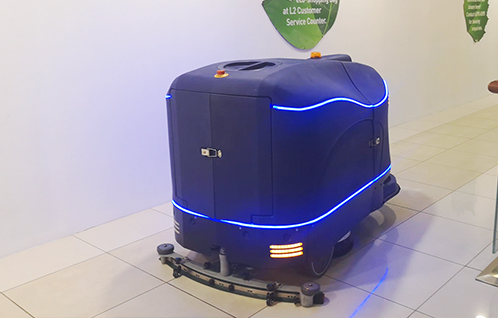 CBM Environmental Division has deployed the iScrubbot at City Square Mall. The machine utilises a mapping AI to automatically scrub and vacuum floors without the need for an operator (think of it as a giant Roomba).
CBM Environmental Division has deployed the iScrubbot at City Square Mall. The machine utilises a mapping AI to automatically scrub and vacuum floors without the need for an operator (think of it as a giant Roomba). 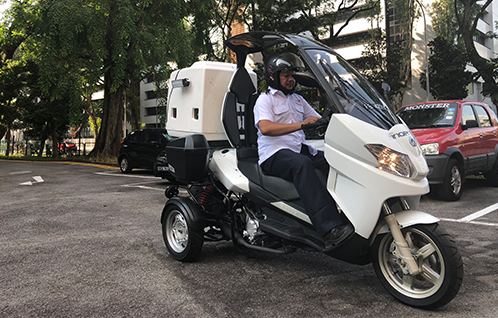 CBM Parking's Mobile Enforcement Vehicle utilises cameras, a license plate recognition engine and a cloud database to cross-reference for parking violations in real time
CBM Parking's Mobile Enforcement Vehicle utilises cameras, a license plate recognition engine and a cloud database to cross-reference for parking violations in real time
One trend in service providers' favour, however, is that industry developments mean that wage costs can increasingly be passed on to clients: "They also feel the pressures of HR (human resource) costs."
The security industry is a case in point. Since 2016, licensed security firms have had to adopt the tripartite progressive wage model, which specifies minimum starting wages. If a client specifies a fixed number of security guards, they will have to be prepared for higher costs whenever the wages are raised under the progressive wage model.
Thanks to this, clients now understand the need to go manpower-lean, says Mr Chiang. "So today, they are more prepared to listen."
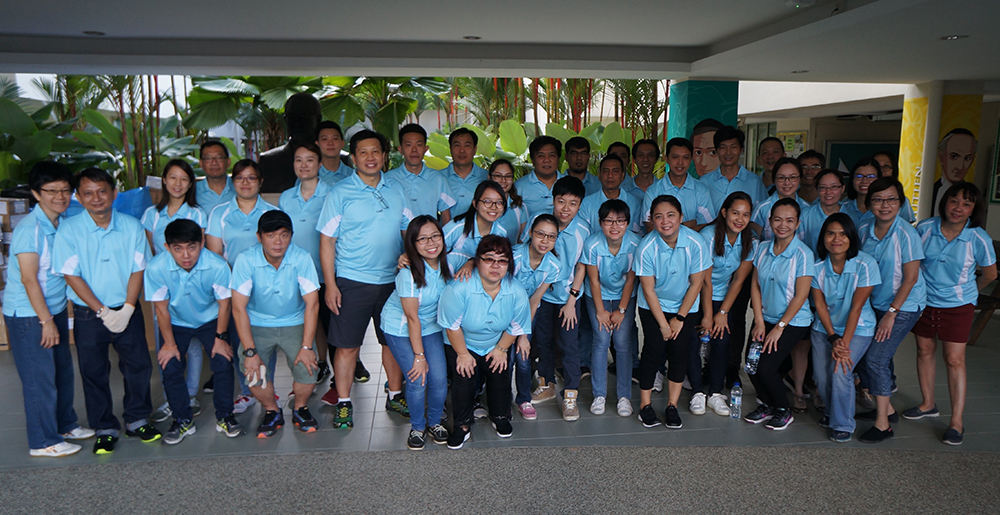 CBM also promotes staff volunteerism. Pictured here are staff volunteers who participated at the Assisi Fun Day 2018 and helped to set up various booths at the fundraising event.
CBM also promotes staff volunteerism. Pictured here are staff volunteers who participated at the Assisi Fun Day 2018 and helped to set up various booths at the fundraising event.


